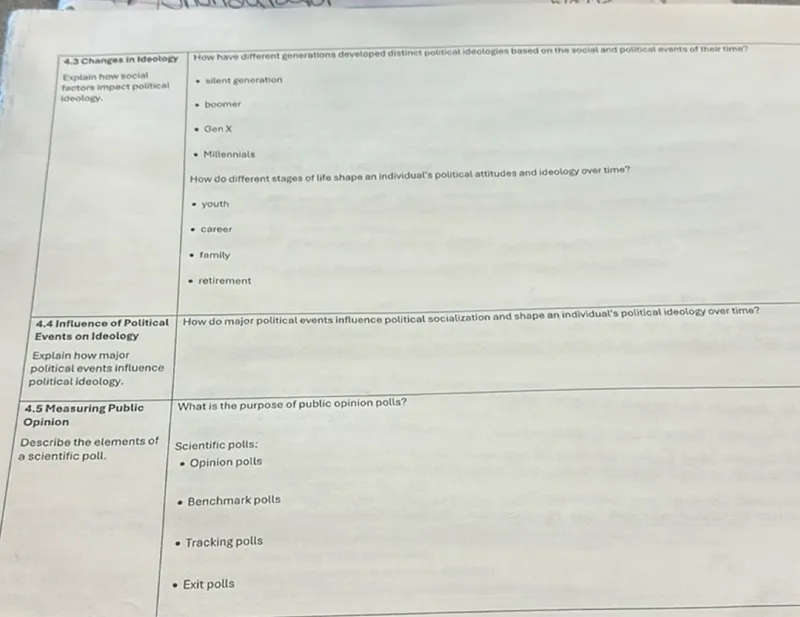Certainly! Let's address the questions systematically, focusing on the impact of social factors on political ideology, generational differences, life stages, political events, and public opinion polls.
Social factors such as economic conditions, cultural norms, education, and media influence political ideology by shaping individuals' values, beliefs, and priorities. For example, economic hardship may lead to support for policies that promote social welfare, while cultural shifts can influence attitudes towards social issues like marriage equality or immigration.
Silent Generation (born 1928-1945): This generation experienced the Great Depression and World War II, leading to a preference for stability and traditional values. They often favor conservative policies and institutions that reflect their experiences of economic recovery and national unity.
Boomers (born 1946-1964): Growing up during the civil rights movement and Vietnam War, Boomers developed diverse political ideologies. Many were influenced by the counterculture movement, leading to liberal views on social issues, while others maintained conservative economic perspectives.
Gen X (born 1965-1980): Witnessing the end of the Cold War and the rise of technology, Gen X tends to value individualism and skepticism towards authority. Their political ideologies often blend fiscal conservatism with social liberalism.
Millennials (born 1981-1996): Shaped by events like 9/11 and the Great Recession, Millennials often prioritize social justice, environmental concerns, and economic equality. They tend to support progressive policies and are more likely to challenge traditional political structures.
Youth: Political attitudes are often shaped by education, peer influence, and media exposure. Young individuals may lean towards progressive ideologies as they explore new ideas and challenge the status quo.
Career: As individuals enter the workforce, economic concerns such as taxes and job security become more prominent, potentially shifting their ideology towards policies that support economic growth and stability.
Family: With family responsibilities, individuals may prioritize policies that benefit education, healthcare, and community safety, influencing a more pragmatic approach to political ideology.
Retirement: In retirement, concerns about healthcare, pensions, and social security can lead to support for policies that ensure financial security and well-being.
Major political events, such as wars, economic crises, and social movements, can significantly influence political ideology by altering perceptions of government effectiveness, social justice, and national identity. For instance, the civil rights movement reshaped views on equality and justice, while the 2008 financial crisis led to increased scrutiny of economic policies and corporate regulation.
Political socialization occurs as individuals internalize the lessons and impacts of these events, shaping their political beliefs and attitudes over time. For example, witnessing government response to a crisis can either increase trust in public institutions or foster skepticism and demand for reform.
Scientific polls are designed to accurately measure public opinion through:
- Sampling: Selecting a representative group of respondents to reflect the larger population.
- Question Design: Crafting unbiased and clear questions to elicit genuine responses.
- Data Collection: Using methods such as phone interviews, online surveys, or face-to-face interviews.
- Analysis: Interpreting data to understand trends and patterns in public opinion.
Public opinion polls serve to gauge the attitudes and preferences of the population on various issues, helping policymakers, researchers, and media understand public sentiment. They can influence political strategy, inform policy decisions, and provide insight into societal trends.
- Opinion Polls: Measure general attitudes towards specific issues or candidates.
- Benchmark Polls: Establish baseline data at the beginning of a campaign or study.
- Tracking Polls: Monitor changes in opinion over time, often during election campaigns.
- Exit Polls: Conducted immediately after voters leave polling stations to predict election outcomes and understand voter behavior.
By considering these elements, we can appreciate how social factors, generational experiences, life stages, and political events shape political ideology and public opinion.






